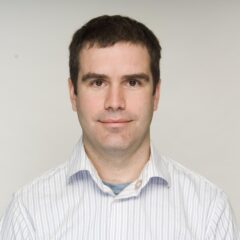Toronto Human Immunology Network in Toronto, ON Canada
About Alberto Martin, PhD

Career path
1. How did you first get involved in immunology?
I got involved in immunology as a graduate student during my PhD. I did this at the University of Toronto with Dr. Florence Tsui, and we started working on a project on an autoimmune disease called polymyositis and dermatomyositis. I was interested in understanding the molecular mechanisms of this disease. This is an autoimmune condition that affects a number of different tissues, including the skin and the etiology of this disease is still not very clear, but one of the hallmarks is that autoantibodies bind to specific proteins that might cause tissue damage. That’s how I got started.
2. Tell us about the research you’re most proud of.
The research that I’m most proud of now is currently underway in my lab. I have a number of different research projects that are very interesting. In one project, we’ve identified a novel gene that’s involved in antibody diversification. To backup a bit, antibody diversification and especially secondary antibody diversification is a process initiated by this enzyme called AID activation that produces antibodies of high affinity in different classes. AID carries out these processes by deaminating deoxycytidines in immune globulin DNA to deoxyuridines. Now the problem with AID is that this lesion that it produces in DNA (i.e. deoxyuridines), cells are very well adapted to repairing these types of lesions. So AID on its own should not be able to induce these processes to induce class switch recombination. What cells need to do is therefore disable this deoxyuridine repair system. And that is what one of our projects that we currently have in submission is about; we identify a novel gene whose product disables the deoxyuridine cell repair system that allows for AID to carry out these two functions of somatic hypermutation and class switch recombination. So we’re very proud of that. That’s one project, but I can tell you of another project. We’ve also identified another novel gene when knocked out, these mice are resistant to inflammatory bowel disease and to obesity, Type 2 diabetes, and non-alcoholic fatty liver disease. We’re currently working on these stories, trying to understand the mechanism of how this gene promotes these various inflammatory diseases. And we’re also trying to identify small molecule inhibitors of this protein to be able to treat mice and ultimately humans to prevent these types of autoimmune diseases or immune inflammatory diseases.
3. What is the most important trait a researcher should possess and why?
Creativity, I think is very important. It allows you to interpret data and to creatively come up with solutions. Curiosity, I think is also very important – especially in the situation where one gets interesting and strange data, which requires one to pursue it and asks the right types of questions. Hard work is also a very important trait. I think those are three important keys: curiosity, creativity, and hard work.
4. What is the biggest lesson you’ve learned?
One of the biggest lessons I’ve learned is transitioning from a postdoctoral fellow to a principal investigator. One lesson that I’ve learned is how different those two jobs are. As a post-doctoral fellow, your job is to do science, to produce data, and to interpret data, and write papers. But as a principal investigator, your job really switches to become more of a manager of individuals. Apart from still managing projects, the goal is to really try and extract as much out of individuals as possible. And each individual is very different, so if the goal is to try to get as much out of that person as possible, what might work for one person might not work for another person. So really tailoring your mentoring and tailoring your requests from individuals to be able to get as much out of them as possible.
5. What advice would you give to young researchers just starting out in the field?
I think the most important thing you should do and not just in research, but in other things is do what you like, do what you love. You know, the more you do what you love, the more effort you put into it, the more love you put into it, the more interest you put into it and you’ll get more out of that. So if you’re doing something that you like, I would say pursue that. That’s probably the most important thing.
6. Describe your average workday.
My average workday is coming to the lab, writing grants, writing papers, and generally speaking to members of my lab, sometimes just chatting with them about a specific western blot that they show me, for example, or show me other data and interpreting that data and then figuring out the next plans for that specific project.
Work with FOCIS and FCE's
8. Switching gears, how did you first get involved with FOCIS?
I attended a meeting maybe ten years ago. This was just in the capacity of being an attendee at the meeting. I went to a lot of talks and I really thought, apart from the fact that I do immunology, that this meeting was more focused on clinical immunology. In many ways, it opened my eyes to see how a lot of basic research, which is what I do and what a lot of my colleagues do, can be applied to the clinic. And so that is the first time I got involved with FOCIS, not as an organization, but by attending one of their meetings.
9. How do you think FOCIS has changed your world?
My research when I first started out was very basic and I would argue that 50% of my work now is translational and with an emphasis on translation. So, I think that that is how FOCIS has really changed my research.
10. If your colleague asked you why they should join FOCIS, what would you tell them?
If your interests are in translational research, I think FOCIS is a very good place to start, especially translational immunology research. It’s a good organization to really help you in that area, I think.
11. Tell us about the research you’re doing.
My specific research, as I said earlier, is with two areas of research that I’m proud of, that’s currently ongoing. We’ve been doing a lot of genetic screens, CRISPR screens, identifying novel genes that are involved in antibody diversification or other types of diseases, such as heart disease, Type 2 diabetes. And we’re identifying novel genes in these pathways. We’re very interested in these diseases and processes. I should say that we’ve been carrying out screens to identify novel genes and antibody diversification processes and in these inflammatory diseases. That’s specifically my research interest currently. So we’re really interested in colon cancer as well as inflammatory bowel disease, Type 2 diabetes, obesity, non-alcoholic fatty liver disease and the mechanisms of these. And we’re also trying to develop interventional methods to treat these diseases in mouse models, but ultimately moving to the clinic.
12. What is the vision/your dream goal of your FCE? What are the specific goals as the FCE Director?
I’m the FCE director for the Toronto region. It’s called the Toronto Human Immunology Network. This network was initially started by Dr. Tania Watts, who ran this FCE for ten years. I’ve taken over this past year. It’s been a bit slow because, of course, COVID hasn’t really helped things, but one of my current goals is to develop a center for human immunology research and education. That’s what it’s actually going to be called: CHIRE (Center for Human Immunology Research and Education). The center is going to expand on the goals of the Toronto Human Immunology Network by continuing to support education of human immunology to basic researchers, but to expand the education to clinical trainees and practicing physicians on human immunology, and also to start supporting research programs that involve human immunology in the Toronto region. The idea is to create a network of subsidized core facilities to do deep immuno-profiling of patients to support clinical research in the Toronto region.
13. What are your biggest challenges?
It’s really bringing together all the clinical departments and basic science departments under one umbrella for this center. There are a number of challenges associated with that because in the Toronto region, there’s a lot of hospital research institutes that harbor these scientists that are in these various basic research science departments and clinical departments, and they all have their own legal departments. That’s why one of the biggest challenges is to deal with sharing patient samples between these various independently minded research institutes for the greater good of the community. That is one challenge, but I can name a thousand different challenges. It’s crazy what I’m doing, but that’s just one challenge when there’s many challenges.
I should say another major challenge is to secure funds, to appropriately resource the centers.
14. Why did you apply to be an FCE?
So I didn’t do this. This was Dr. Tania Watts who did this to become a FOCIS Center of Excellence, to bring the community of clinical researchers and basic researchers in the Toronto region closer to other clinical researchers in North America and around the world. FOCIS is a great community to bring like-minded clinical researchers that work on human immunology together. That’s one of the main reasons why she did this. It’s really also to showcase our work and establish collaborations with other groups around the world.
Those are all the questions for today, thank you for your time.
